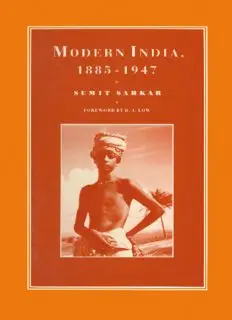
Modern India 1885–1947 PDF
Preview Modern India 1885–1947
MODERN INDIA, 1885-1947 MODERN INDIA 1885-1947 SUMIT SARKAR Professor of History Delhi University Foreword by D. A. Low Palgrave Macmillan ISBN 978-0-333-43806-0 ISBN 978-1-349-19712-5 (eBook) DOI 10.1007/978-1-349-19712-5 © Sumit Sarkar 1983, 1989 Foreword©D. A. Low 1989 Softcover reprint of the hardcover 1s t edition 1989 All rights reserved. For information, write: Scholarly and Reference Division, St. Martin's Press, Inc., 175 Fifth Avenue, New York, NY 10010 First published in the United States of America in 1989 ISBN 978-0-312-01299-1 Library of Congress Cataloging-in-Publication Data Sarkar, Sumit, 1939- Modern India, 1885-1947/Sumit Sarkar. p. cm. Bibliography: p. Includes index. ISBN 978-0-312-01299-1: $45.00 (est.) I. India-History-1765-1947. I. Title DS479.S265 1988 954.03 '5-dcl 9 87-28930 CIP To Tanika CONTENTS Foreword xiii Preface to the First Edition xv Preface to the Second Edition xviii Abbreviations xxv CHAPTER I Introduction CHANGE AND CONTINUITY 1 OLD AND NEW APPROACH ES 4 CHAPTER II 1885-1905: Political and Economic Structure IMPERIAL STRUCTURE AND POLICIES 12 Viceregal Attitudes 13 Foreign Policy 14 Army 16 Financial and Administrative Press ures 17 Local Self Government and Council Reform 19 Divide and Rule 20 White Racism 22 THE COLONIAL ECONOMY 24 Drain of Wealth 24 Deindustrialization 28 Commercialization of Agriculture 30 Land Relations 32 Agricultural Production 36 Foreign Capital 37 Indian Capitalist Development 38 CHAPTER III 1885-1905: Social and Political Movements TOWARDS A 'HISTORY FROM BELOW' 43 TribaI Movements 44 Phadke 48 V\ll CONTENTS Moplahs 49 Deccan Riots 50 Pabna 51 No-Revenue Movements 53 Caste Consciousness 54 Communal Consciousness 59 Labour 61 BUSINESS GROUPS AND UPPER CLASSES 63 Business Groups 63 Princes and Zamindars 64 'MIDDLE-CLASS' CONSCIOUSNESS AND POLITICS 65 Social Roots of the Intelligentsia 65 Hindu Reform and Revival 70 Trends in Indian Islam 76 Patriotism in Literature 82 Nationalist Economic Theory 86 Foundations of the Congress 88 The Moderate Congress: Objectives and Methods 89 Phases of Moderate Politics 92 Roots of Extremism 96 CHAPTER IV 1905-1917: Political and Social Movements THE VICEROY ALT Y OF CURZON 96 Foreign Policy 96 Administrative Reforms 102 Curzon and Nationalists 105 Partition of Bengal 106 1905-1908: THE SWADESIII MOVEMENT IN BENGAL 111 Trends 112 Boycott and Swadeshi 115 National Education 117 Labour Unrest 118 Samities 119 Hindu-Muslim Relations 121 The Shift to Terrorism 123 1905-1908: EXTREMISM IN OTHER PROVINCES 125 Punjab 126 Madras 129 Maharashtra 132 CONTENTS ix The Congress Split 135 1909-1914: REPRESSION, CONCILIATION AND DIVIDE AND RULE 137 MorIey and Minto 137 Simla Deputation and Muslim League 140 Revolutionary Terrorism 144 WAR AND INDIAN POLITICS 147 Revolutionary Activities 147 Unity at Lucknow 149 Horne Rule Agitation 151 1905-1917: MOVEMENTS FROM BELOW 153 Tribai Revolts 153 Peasant Movements 155 Communalism 156 Caste Movements 158 Regional Sentiments and Languages 162 CHAPTER v 1917-1927: Mass Nationalism-Emergence and Problems WAR, REFORMS AND SOCIETY 165 The Montford Reforms 165 Impact of the War 168 MAHATMA GANDHI 178 The Appeal of Gandhi 178 The Role of Rumour 181 Champaran, Kheda, Ahmedabad 183 ROWLATTSATYAGRAHA 187 1919-1920: LEADERS AND MASSES 195 Gandhi, Khilafat and the Congress 195 Press ures from Below 198 1921-1922: NON-COOPERATION AND KHILAFAT 204 The AIl-India Movement 204 Social Composition 206 Regional Variations 210 Chauri-Chaura 224 1922-1927: DECLINE AND FRAGMENTATION 226 No-Changes and Swarajists 227 Nagpur, Barsad and Vaikom 228 Constructive Work 229 Swarajist Politics 231· Communalism 233 x CONTENTS 1922-1927: EMERGENCE OF NEW FORCES 237 Political and Economic Tensions 237 Tribai and Peasant Movements 239 Caste Movements 242 Labour 244 Emergence of the Communists 247 Revolutionary Terrorism 251 Subhas and lawaharlal 252 CHAPTER VI 1928-1937: Nationalist Advance and Economic Depression 254 AN OVERVIEW Cross-Currents in Politics 254 Depression and India 257 1928-1929: SIMON BOYCOTI AND LABOUR UPSURGE 261 Simon Commission and Nehru Report 261 Youth Movements 266 The HSRA 267 Labour Upsurge and the Communists 269 Pe asant Movements and Bardoli 274 Business Attitudes 279 From Dominion Status to Puma Swaraj 281 1930-1931: CIVIL DlSOBEDlENCE 284 Towards Sah Satyagraha 284 Chittagong, Peshawar, Sholapur 286 Phases of Civil Disobedience 289 Regional Studies 296 The Round Table Conference 308 Gandhi-Irwin Pact 310 MARCH-DECEMBER 1931: UNEASY TRUCE 311 Ambiguities 311 Pressures from Below 314 Official Attitudes 318 1932-1934: SECOND CIVIL DISOBEDIENCE MOVEMENT 320 Repression and Resistance 320 Business Realignments 325 Harijan Campaign 328 CONTENTS XI Return to Council Politics 330 The Left Alternative 331 1935-1937: THE CONSTITUTION AND THE CONGRESS 336 The 1935 Act 336 Labour and Kisan Movement 339 Leftism in Literature 342 Lucknow and Faizpur 343 Right Consolidation and Business Pressures 344 CHAPTER VII 1937-1945: Political Movements and War 1937-1939: THE CONGRESS MINISTRIES 349 Elections and Ministry-making 349 Congress and Bureaucracy 352 The Communal Problem 352 Gandhian Reforms 357 Capitalists and Congress 358 Congress and Labour 361 Congress and Kisans 362 States Peoples Movement 365 The Left in the Congress 370 The Tripuri Crisis 372 1939-1942: WAR AND INDIAN POLITICS-THE FIRST PHASE 375 Bureaucratic Counter-offensive 375 League and Pakistan 377 Trends within the Congress 380 Economic Consequences 383 The New Phase of the War 384 Cripps Mission 385 1942-1945: QUIT INDIA. FAMINE. AND THE LAST PHASE OF WAR 388 Roots of Rebellion 388 The All-India Pattern 394 Social Composition 396 Regional Variations 399 The War and the Indian Economy-Famine and Super Profits 405 The Advance of the League 408 Azad Hind 410 Communists and People's War 411
